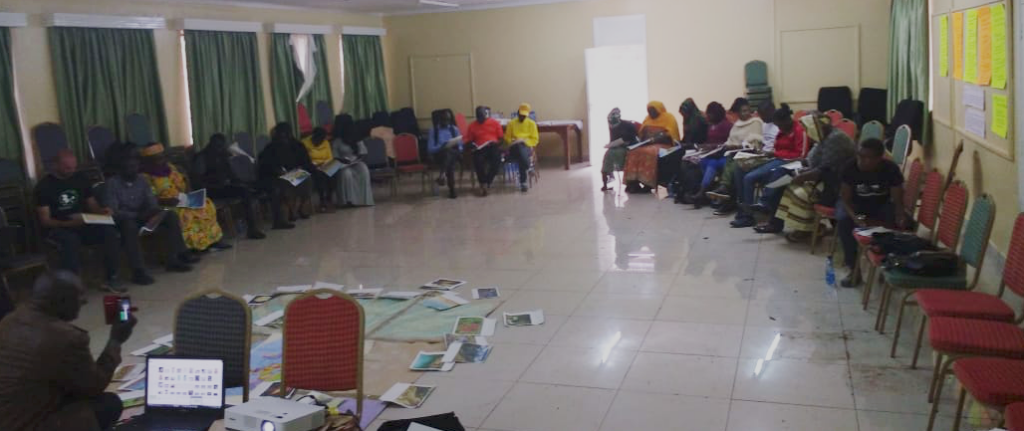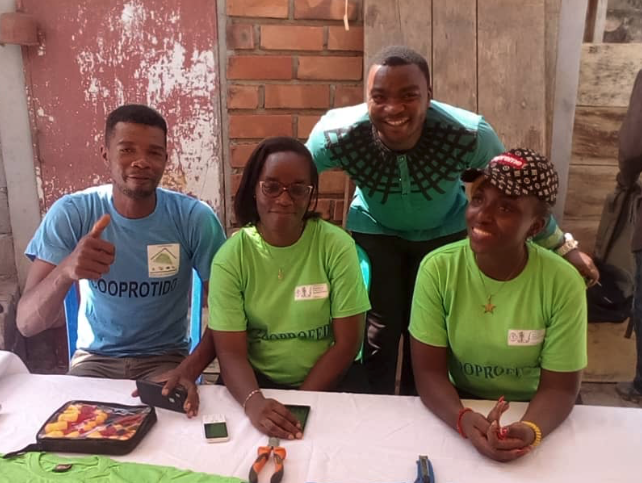Written by Elise Pierrette Memong Meno, RIPESS Board Member on behalf of RAESS
The International Congress on Cooperation and Global Citizenship organized under the initiative of the Campaign for a Global Curriculum of Social and Solidarity Economy, in partnership with RIPESS, was held from 9 to 11 December 2018 in Kibera, Kenya. The aim was to exchange best practices to plan future cooperation actions together for a real transformation at local and global levels. Some 50 youths from Tanzania, Uganda, Rwanda and Kenya attended, as well as experts from Brazil, Chile, Cameroon, Kenya, and other participants from Europe who participated via conference call. Participants were given six video presentations, two from RIPESS.
It is also important to highlight all the work done by the organization to ensure participation via Whatsapp for all those who could not attend the conference physically. Thus, the congress was able to benefit from the feedback of different people who followed the event via live streaming on Facebook and using Whatsapp, thanks to the volunteers who followed up and translated the debates into three languages. This was particularly the case for African youths because the young members of RAESS took part in exchanges (Cameroon, Mali, Togo, Senegal, Côte d’Ivoire) on social media.
Youth employment in Africa is a growing problem and SSE is an opportunity
As a representative of RAESS Africa and RIPESS Intercontinental (and as a board member), my mission, in addition to bringing concrete examples to the alliance between the Campaign for a World Curriculum of the Social and Solidarity Economy and RIPESS, was to (1) bring together the English-speaking countries in RAESS so that ESS can be addressed in Africa with all its sensitivities (awareness raising work that will also be done with Portuguese-speaking countries); (2) Strengthen the dynamics of RAESS youth and (3) Engage African youth to make their voices heard at the WSF on Transformative Economies.

These three days were organized around five thematic axes: Culture of Peace and Sports for Peace; Education for Cooperative Solidarity Economies; Education for Sustainability and Women’s Empowerment; Youth for a Global Education of Democratic Transformation; and Territories and Schools.
I was in charge of leading the workshop on education for cooperative solidarity economies. Youth employment in Africa is a growing problem, with a high number of young Africans exposed to unemployment or limited by precarious, temporary or low quality jobs. Social and Solidarity Economy (SSE) is an opportunity because it gives all these young people the opportunity to create collective enterprises taking into account their talent. In doing so, they can create jobs for themselves, but also to recruit other young people who appreciate solidarity and simplicity in the human and professional relationships found in SSE enterprises.
Kibera has been a revealing experience for young people in East Africa, most of whom practice SSE without knowing it. Their exchanges allowed identifying many practices that should be popularized. There are many networks and movements that bring together many young people around a variety of economic activities based on joining efforts and respecting the values of justice, solidarity and transparency…
This meeting generated a deep desire among these young people to better understand SSE. The Campaign for a Global Curriculum of Social and Solidatiry Economy is of interest to them as well as any other training that would bring them up to speed in this regard.

As for the participants of the RAESS youth networks, in particular from Mali and Cameroon, they intervened to bring the voice of youth and the challenges they face. For example, youths from Cameroon stated that “the problem is how to share our experiences and efforts to enhance the value of our actions. How could we boost SSE? What tools do we have and what tools do we still need?”
Youths from Mali stressed the role of Renapess, where youth play a predominant role, and its activities focused on promoting the social and solidarity economy, such as training seminars on young entrepreneurship at schools and universities; and training sessions on developing projects.
The Charter emphasizes that young people must be able to participate in decision-making processes of public policies
Another outcome of this event is that three of the four countries that attended the Congress have already started the process of joining RAESS, namely Kenya, Tanzania and Uganda. It is with them that RAESS will be at the Barcelona 2019-2020 meeting.
The Congress ended with the adoption of the Kibera Charter that was discussed line by line by young critical activists in a stimulating dialogue and was approved and read out in a plenary session. This document has a list of eight recommendations to make Africa’s voice heard at the next WSF on Transformative Economies in 2020 in Barcelona. Among other things, the charter calls for the strengthening of youth networks in Africa and for all countries on the continent to join RAESS. It also emphasizes that young people must be able to participate in decision-making processes of public policies and encourages the participation of women and youths in solidarity economy initiatives.
In addition to the approval of the Charter, 5 action plans have been developed, involving different organizations. One of them, led by Pierrette, Rosemary Olive Mbone Enie and Robert Ougandais, aims to strengthen and expand RAESS Africa.
The outcomes of the Kibera 2018 Congress on the Campaign for a World Curriculum for Social and Solidarity Economy will have a clear impact beyond the boundaries of the experience, particularly to connect the points of human history in the development of a fairer world, free of suffering, and a world of solidarity. Thank you all.





Leave A Comment